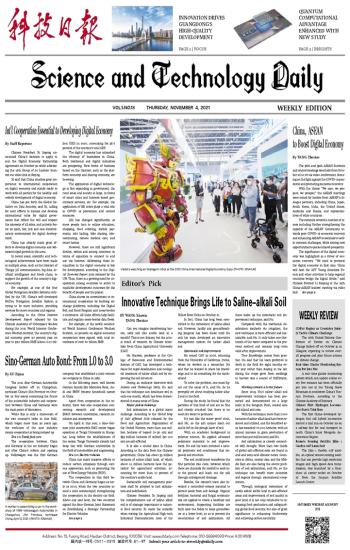
 Innovation Drives Guangdong's High-quality Development
Innovation Drives Guangdong's High-quality Development Quantum Computational Advantage Enhanced with New Study
Quantum Computational Advantage Enhanced with New Study Int'l Cooperation Essential to Developing Digital Economy
Int'l Cooperation Essential to Developing Digital Economy China, ASEAN to Boost Digital Economy
China, ASEAN to Boost Digital Economy Innovative Technique Brings Life to Saline-alkali Soil
Innovative Technique Brings Life to Saline-alkali Soil WEEKLY REVIEW
WEEKLY REVIEW Sino-German Auto Bond: From 1.0 to 3.0
Sino-German Auto Bond: From 1.0 to 3.0 S&T DAILY WECHAT ACCOUNT (EN)
S&T DAILY WECHAT ACCOUNT (EN) PHOTO NEWS
PHOTO NEWS
 |
| A worker is assembling a car in the workshop of FAW-Volkswagen Automobile in Changchun, Jilin Province, northeast China, April 2, 2021. (PHOTO: XINHUA) |
The 2021 Sino-German Automobile Congress kicked off in Changchun, northeast China's Jilin Province on October 19. Key issues concerning the future of the automobile industry and cooperation between China and Germany were the main point of discussion.
While this is only a microcosm of the two country's links in this field, which began more than 30 years ago, the evolution of the auto industry means cooperation is being ramped up.
Era 1.0: Fossil-fuel cars
The cooperation between China and Germany in the car industry began just after China's reform and opening up. Volkswagen was the first German company that established a joint venture car company in China in 1985.
In the following years, well known German brands like Mercedes Benz, Audi and BMW became household names in China.
Apart from cooperation in the industry, there was also cooperation concerning research and development (R&D) between universities, research institutes and enterprises.
On April 21 this year, a Sino-German joint automobile R&D center began operation at Tongji University in Shanghai. Long before the establishment of the center, Tongji University already had deep ties with German universities in the field of automobiles and engineering.
Era 2.0: Electric vehicles
China has made massive efforts to reduce carbon emissions through various approaches, such as promoting the use of New Energy Vehicles (NEV).
The cooperation in this field between China and Germany began as early as 2010, when the two countries issued a joint communiqué, strengthening the cooperation in the electric car field. About one year later, the two countries signed the Sino-German Joint Statement on Establishing a Strategic Partnership for Electric Vehicles.
Five joint meetings on electric vehicles strategic partnership have been held, setting up a platform for coordination between the involved departments from both countries, strengthening the communication and cooperation in terms of the standards and regulations, encouraging policies, scientific research and application of electric vehicles .
In the past ten years, the in-depth cooperation in the electric vehicles industry between the two countries achieved fruitful results. Several German car companies have established joint ventures with their Chinese counterparts.
There has been cooperation among universities and research institutes as well. In 2010, Chinese Ministry of Science and Technology and German Federal Ministry of Education and Research jointly launched a joint R&D center on electric vehicles. Together with 19 enterprises, 15 top universities and research institutes from both countries like Tongji University and Technical University of Munich achieved good results from projects concerning new lightweight electric vehicles.
Era 3.0: Intelligent connected vehicles
Roads of more than 3,500 kilometers have been intelligently upgraded, and there have been more than five million cars carrying Internet connected terminals, according to Xiao Yaqing, minister of Information and Technology, at the 2021 World Intelligent Connected Vehicles Conference.
Actually, China and Germany already signed a joint declaration of intent on cooperation in the area of automated and connected driving in 2018, focusing on several aspects, including coordination and promotion of (on-going) international standardization processes with regard to automated and connected driving.
In response to the declaration, a road test area for intelligent connected vehicles (ICVs) was launched in Chengdu, capital of Sichuan province. This was also the first cooperation project in terms of ICVs between China and Germany.
A Sino - German center on ICVs promotion and application was also established in Shanghai in 2020 to promote deeper bilateral cooperation in this field.
The cooperation in application of ICVs went deeper when the Chinese Academy of Information and Communications Technology and German Association of the Automotive Industry jointly started a cooperation project on ICVs and smart cities on July 2.
Supported by both governments and the automobile industry, the bilateral cooperation yielded a win -win result. The continuous evolution of the automobile industry is going to bring more opportunities for cooperation between the two countries.

 Next
Next



